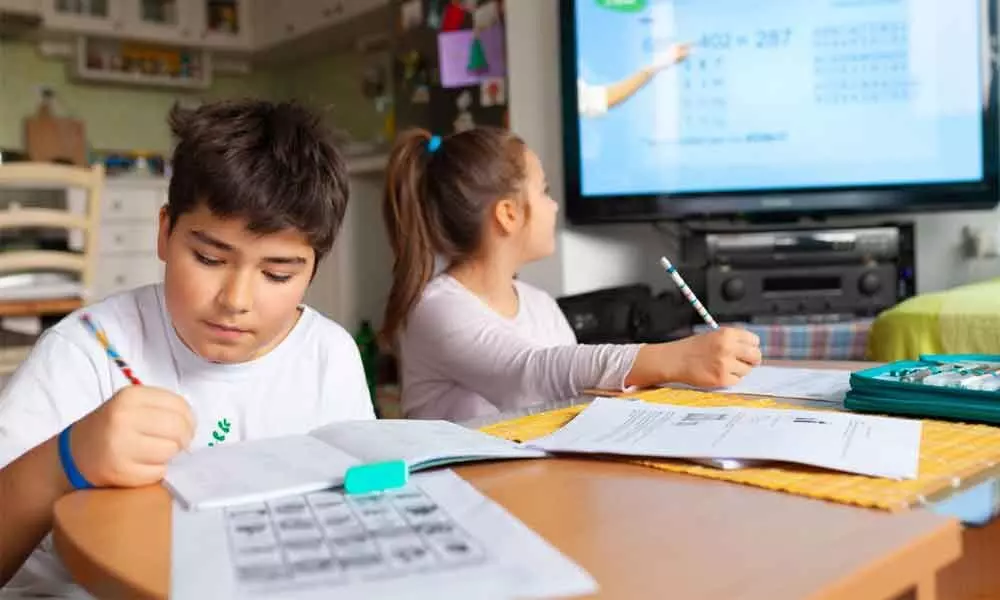Live
- Climate change risks impacting financial system, need India-specific data: RBI’s Rajeshwar Rao
- Nitish Kumar Reddy is a star of Indian cricket, says Sunil Gavaskar
- Winter Hydration Made Easy: 5 Essential Tips to Stay Healthy
- 19 Pakistani soldiers, 3 Afghan civilians killed in clashes between Afghan-Pak border forces
- Kolusu Parthasarathy Lauds Nitish Kumar Reddy
- Chandrababu honours Telugu figures on constitution’s 75th anniversary, releases calendar
- CM Chandrababu and Venkatesh lauds Nitish Kumar Reddy for maiden century at MCG
- Manipur: Militants open fire, injure four; CM condemns attack
- Women investors in Indian mutual fund industry grow 2.5 times in 2024
- Saudi Arabia allocates 500 million USD to support Yemeni government
Just In
Closure of schools will be detrimental in the long run


Closure of schools will be detrimental in the long run
Closure of schools and its psychological impact on children and adolescents’ health, resulting from staying at home for several weeks with uncertain perspectives for the near future, is a crucial issue.
Closure of schools and its psychological impact on children and adolescents' health, resulting from staying at home for several weeks with uncertain perspectives for the near future, is a crucial issue. The worst consequences of this temporary shutdown are experienced by the most vulnerable children who already rely on school for educational, nutritional, and health needs due to their socio-economic disadvantages or disabilities.
In addition to the possible lack of parental support at home, major inequalities arise in the access to digital learning resources. With the aim of ensuring continuity, inclusion, and equity for all students, the UN Educational, Scientific and Cultural Organisation (UNESCO) has launched the Global Education Coalition, calling for coordinated and innovative actions to support students through remote learning and to guide the school reopening phase, thanks to the involvement of public and private stakeholders. The Covid-19 crisis highlights that school fulfils not only an educational mission of knowledge acquisition, but it also satisfies the socialisation needs of young people.
With students at home, the school community is absent and despite the virtual interactions and learning opportunities provided by the internet and social networks, a barrier is created in the educational relationship between pupils and teachers. Moreover, children are missing a physical space in which to share interests, thoughts, hopes, and emotions among peers. School provides a structured setting in which children can learn and develop social competencies, such as self-confidence, friendship, empathy, participation, respect, gratitude, compassion, and responsibility. Social and emotional learning is important for young people to become conscious members of a solidarity-based community. The Covid-19 crisis gives us the opportunity to re-assess what type of school we want for the future. Schools are also places where health literacy takes place.
Teachers usually act as health promoters too for their students from a young age inculcating in them a good personal hygiene and by raising awareness of the consequences of risky behaviours. Health education is important now and the governments should brace up for training the teachers to impart the same through digital education at least. A system must be in place shortly wherein everyone has access to on-line education. It is a serious issue and all governments should come together on the issue.
For a more inclusive and student-centred education, didactic methodologies, such as cooperative learning (based on student collaboration), should be used to convey health topics among students, to encourage personal reconstruction of knowledge, and to engage them with adopting healthy lifestyles. A wide range of participatory activities can be used, including debates, small working groups, authentic learning activities (concerning real-life situations), storytelling, role playing, educational games and simulations, audio and visual laboratories, or arts, music, theatre, and dance. Revisiting the economy, industry, employment etc., are necessary. But it is also important that education is also looked at. The UNESCO Chair on Health Education and Sustainable Development has reiterated that it strongly believes that education is health. Developed world is looking at solutions for the educational crisis. Are we even thinking of it?

© 2024 Hyderabad Media House Limited/The Hans India. All rights reserved. Powered by hocalwire.com






